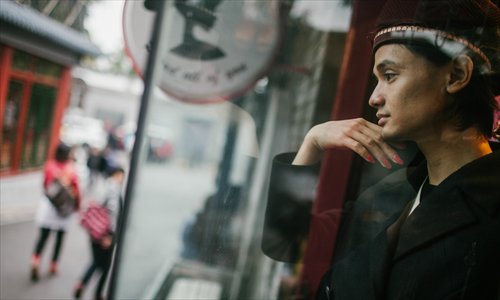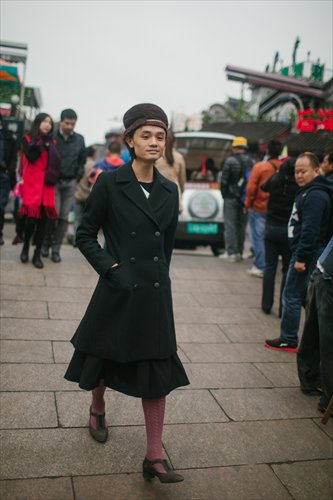Lack of legal protection, awareness, medical help pose barriers for community
Recently, a transgender woman ran into a problem while trying to use a public bathroom. When she tried to use a woman's bathroom, she was called a pervert and a security guard threatened to call the police. This incident reflects problems many transgender people encounter in China, including the fact that the public doesn't know much about them, and there are only a few groups that fight to ensure their rights.

Quanjie stands in her shop and looks out into the hutong. Photo: Li Hao/GT

Quanjie walks in the Houhai area of Beijing wearing a dress, stockings and high heels. She often draws the attention of crowds while in public. Photo: Li Hao/GT
When I asked Quanjie how I should refer to her in this story, she laughed and joked "not he, not she, maybe 'it.'"
What she meant was, she didn't identify with either gender. She was assigned male at birth but now maintains a woman's appearance.
We later settled on "she," because of how she presents herself publicly.
At that time, Quanjie sat across from me in her antique clothing shop in a colorful dress, dark coat and a brown hat with laces. She wore a purple pair of knitted leggings and high heels. She is tall, lean, and when she talked, she bowed her head to look at me, and sometimes she raised her hand - adorned with red nail polish - to tuck her hair behind her ear.
She called herself Chaoxiaomi, a name she uses in all her social media outlets, but people usually call her "Quanjie." Literally, the word means "sister circle," because, she explained, she's been in the circle for a long time. The transgender circle, she added.
Quanjie came to public attention two weeks ago, when she ran into some issues with a bathroom in a mall in the commercial area of Xidan, Beijing's Xicheng district. She was thrown out of a men's bathroom, but when she went into a women's one, she was called out by a security guard, who called her a pervert and threatened to call the police.
"The reality is, not many people know about transgender people," Quanjie said. "They see a 'man' wearing a dress in a women's bathroom, they think you are a pervert."
Set yourself free
Quanjie always knew she was interested in men. For a long time, she thought she was gay, even though she liked women's clothes.
The turning point came in 2009. She liked a man, who seemed to also like her back. But one day, he said to her, "Can't you make your hair shorter?"
Back then, her hair was down to her shoulders. But she didn't want to cut it just to maintain a "man's appearance" in others' eyes, and his words triggered her to act on her buried feelings.
That evening, Quanjie went into a store and bought a pair of pantyhose, and put them on for the first time. She remembers the moment the fabric touched her legs, and how comfortable she immediately felt. Then, she put on a pair of high heels and walked out of her apartment.
The first people she encountered were a few construction workers. When they walked past her, most turned to look at her. She remembers hearing them say, "What a freak," but she didn't care.
"A feeling overcame me, which is that I'm finally different from all those people," Quanjie said. "And I felt free."
Right now, most transgender people are still not visible in the Chinese society. There isn't an official count on how many transgender people live in China, despite research from grass-roots organizations.
Joanne Leung, founder of the Hong Kong-based Transgender Resource Center, wrote in Gossip Boys and Girls, a manual she put together in 2012 to provide information on transgender people, that some say 1 in 1,000 people is transgender, but others believe the actual number is larger.
Furthermore, there is little information being presented to the public about transgender people. Many people don't even know this group exists, let alone distinguishing between transgender, transsexual, or cross-dressers. Right now, there is no policy or law that protects the rights of this group.
A rocky road
Being "free" has had consequences for Quanjie.
She often gets harassed in public for wearing skirts and heels. Once, she was riding on a bus when a passenger saw her wearing a dress and started harassing her, asking "What kind of monster are you?"
Other common issues include where to go to the bathroom and how to shop for clothes. Quanjie usually goes into fancy hotels to use their unisex bathrooms, while others simply hold it in until they get home.
Hitomi, a 16-year-old transgender man, said another important issue for the community is getting hormone injections to change their appearance.
He started getting injections last December, and after a couple of days, his voice became deeper, and pimples started sprouting on his face.
Being transgender in the broad sense means one is discontent with the gender one is assigned at birth. Some people go through surgery to change their sex, or use hormonal drugs or injections to change their appearance, and some choose to not to do anything at all.
For those who do wish to change their sex, the road is a difficult one.
Right now, hormonal injections are only available with a prescription in China, and only a few hospitals provide hormonal treatment.
Hitomi told his parents about being transgender when he was 14. After a year of struggle and research, his parents made peace with him. This had made things much easier. He went to Japan last year and was prescribed 10 doses of injections from a hospital.
He knows that some people who cannot access such hospitals buy injections online, usually sourced from overseas, and administer themselves. Since many don't know what dose to give themselves, these injections could cause damaging side effects, some of which are fatal.
In 2012, the American Psychiatric Association eliminated the term "gender identity disorder" from its diagnostic manual. In China, CCMD-3 - the latest edition of the Chinese Classification of Mental Disorders, which was published in 2001 - still classifies transsexuals, or people who seek to change their sex, as having Gender Dysphoria and recommends they receive treatment. In China, people can only switch the gender marker on their ID cards after surgery to change their sex.
But this brings out another issue. Many records and files are associated with one's ID card, such as academic degrees. If someone changes the gender marker on the ID card, then this person must contact all the related schools, companies and organizations to change the gender on all such documents.
"Some choose an extreme path and get a fake ID, but that's not advisable," said Xu Bin, director of Common Language, a non-profit organization that educates the public on sexual and gender diversity and pushes for equal rights. "I know someone in Henan Province who bought a fake ID and got married. But his scheme was finally exposed and he was punished for marriage fraud."
Almost unknown
All these issues require some kind of policy or legal solution. But now they are not even on the agenda for discussion. There are also only a few groups working on improving the rights of this community. The number is tiny compared with hundreds of groups on gay and lesbian rights, Xu said.
In February, Common Language organized a discussion group with experts and college professors on legal issues related to sexual and gender diversity. Xu found that when the concept of "transgender" was brought up, many were confused.
In the end, Xu hopes to at least introduce these issues first, to tell legal experts what transgender people need, before talking about how to safeguard their rights.
"A few rights we are talking about include establishing unisex bathrooms like they have abroad, employment discrimination, and issues related to health," she said.
She hopes transgender people can be covered by the anti-discrimination clause in employment, specifically the clause banning gender discrimination.
In January, the Asia Catalyst, an independent research organization that focuses on marginalized groups, released a report titled My Life is Too Dark to See the Light. It interviewed 70 transgender people in China, and most have said it's difficult to get a real job and they get harassed by police all the time. In fact, many rely on dancing in pubs or sex work to support themselves.
But right now, this talk is just talk. Most people are still at the stage at which they need to build their awareness of transgender issues.
Their exposure to the public is led by a few Chinese celebrities. In 2011, Jin Xing, a transgender dancer, came into public view. She underwent sex reassignment surgery in the 1990s, now has her own TV talk show, and is followed by millions.
In January this year, famous writer and sociologist Li Yinhe openly admitted her long-time partner is a transgender man.
Li openly said many times that "I am not a lesbian … I met a transgender man who was assigned female at birth, but identifies as male." But many netizens still called her a lesbian, and said she had come out of the closet.
Activists believe as society becomes more aware of such issues, it will be easier to push for certain rights.
Right now, Hong Kong and Taiwan are a little ahead of the Chinese mainland, but it wasn't long ago that no information or protection was available for these people in those places too.
"Twenty years ago Hongkongers saw transgender people in a negative light, and the media reported on them as odd news. But now people are giving them more tolerance, saying it's their personal issue," Leung said.
In Taiwan, the government passed a policy in 2014 that enables transgender people to change the gender marker on their official documents without having to go through surgery. In Hong Kong, activists are pushing for the same thing, as well as an antidiscrimination law and medical and marital benefits.
In the Chinese mainland, however, things need to start at a more basic level, spreading awareness, with more transgender people coming into public view.
"I hope people can realize there are more than two genders," Quanjie said. "In fact, it would be better if there was no concept of 'gender' at all."
Newspaper headline: The transgender gap